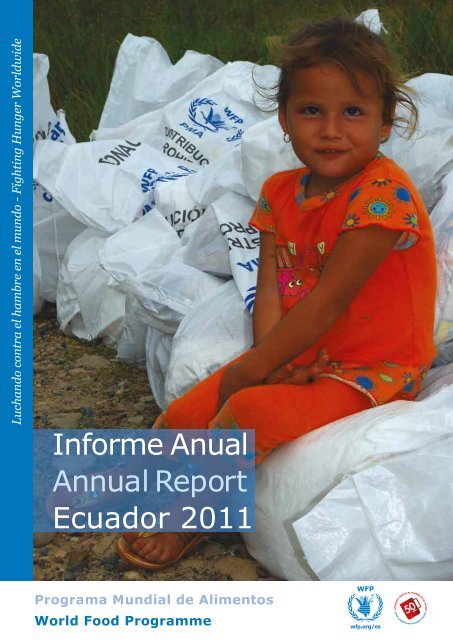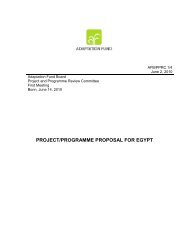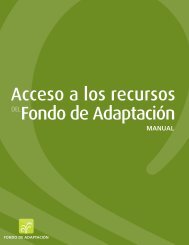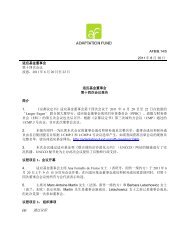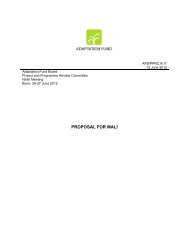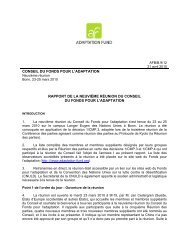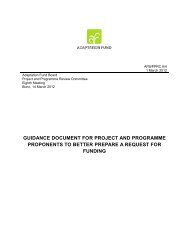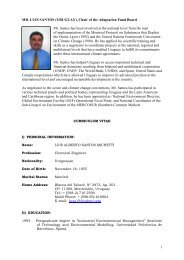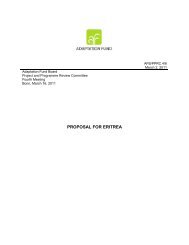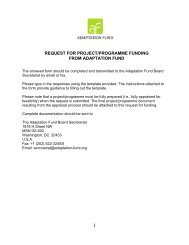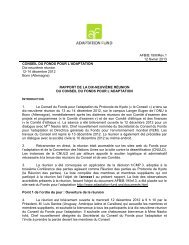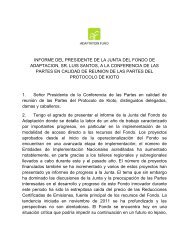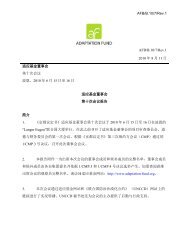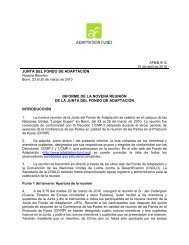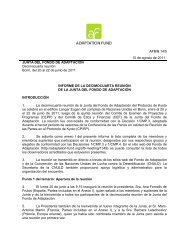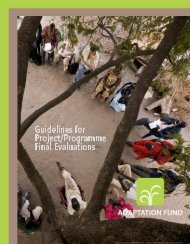Informe Anual Annual Report Ecuador 2011 - Adaptation Fund
Informe Anual Annual Report Ecuador 2011 - Adaptation Fund
Informe Anual Annual Report Ecuador 2011 - Adaptation Fund
Create successful ePaper yourself
Turn your PDF publications into a flip-book with our unique Google optimized e-Paper software.
Luchando contra el hambre en el mundo - Fighting Hunger Worldwide<br />
<strong>Informe</strong> <strong>Anual</strong><br />
<strong>Annual</strong> <strong>Report</strong><br />
<strong>Ecuador</strong> <strong>2011</strong><br />
Programa Mundial de Alimentos<br />
World Food Programme
Para mayor información, por favor contacte a:<br />
/ For further information, please contact:<br />
Deborah Hines<br />
Representante del PMA en el <strong>Ecuador</strong><br />
/ WFP Representative in <strong>Ecuador</strong><br />
Deborah.Hines@wfp.org<br />
Gabriela Malo<br />
Información Pública<br />
/ Public Information<br />
Gabriela.Malo@wfp.org<br />
Todos los derechos reservados. Se autoriza la reproducción<br />
y difusión del material contenido en este producto<br />
informativo para fines educativos u otros fines no<br />
comerciales, sin previa autorización escrita de los titulares<br />
de los derechos de autor, siempre que se identifique<br />
claramente la fuente.<br />
Se prohibe la reproducción del material contenido en este<br />
producto para reventa u otros fines comerciales sin previa<br />
autorización escrita. Las peticiones para obtener tal<br />
autorización deberán dirigirse al Director de la División de<br />
Comunicaciones, e-mail: wfp.publications@wfp.org.<br />
La mención u omisión de empresas, sus productos o<br />
marcas comerciales en particular no implica que el<br />
Programa Mundial de Alimentos los apruebe o recomiende.<br />
All rights reserved. Reproduction and dissemination of<br />
material in this information product for educational or<br />
other non-commercial uses are authorized without any<br />
prior written permission from the copyright holders<br />
provided the source is fully acknowledged.<br />
Reproduction of material in this information product for<br />
resale or other commercial purposes is prohibited without<br />
written permission. Applications for such permission<br />
should be addressed to the Director, Communications<br />
Division, e-mail: wfp.publications@wfp.org.<br />
The mention or omission of specific companies, their<br />
products or brand names does not imply any endorsement<br />
or judgement on the part of the World Food Programme.<br />
© WFP 2012<br />
Fotografía / Photographs:<br />
El Comercio, US Embassy, Rafael Martínez.<br />
Fotografías PMA / WFP photographs:<br />
Cecilia Alvarado, Danny Arteaga, Jorge Arteaga,<br />
Raúl Ayala, Anne-Karine Brodeur, Luis Fernández,<br />
Carmen Guevara, Nelson Herrera, Deborah Hines,<br />
Leonardo Hinojosa, Ilaria Lazzarini, Gabriela Malo,<br />
Verónica Molina, Nelson Ortega, Sebastien Paque,<br />
Diego Rosero, Katherine Shea, Paola Unda, Luis Yanchatipán.<br />
Diseño / Design: creativosunidos.es
Índice<br />
Contents<br />
Diálogo para construir una estrategia<br />
participativa<br />
Dialogue for building a participatory<br />
strategy<br />
2<br />
Acciones innovadoras para la seguridad<br />
alimentaria y nutricional<br />
Nuevas soluciones para la seguridad<br />
alimentaria y nutricional<br />
Innovative actions for food and nutrition<br />
security<br />
Innovative solutions for food and<br />
nutrition security<br />
6<br />
14<br />
Capacidades fortalecidas<br />
Preparación y respuesta a emergencias<br />
Conocimiento y evidencia<br />
Eventos<br />
Aliados<br />
Strengthened capacities 17<br />
Emergency preparedness and response 19<br />
Knowledge and evidence 21<br />
Events 25<br />
Allies 28<br />
Visitas de donantes<br />
Mapa de la cooperación del PMA en el<br />
<strong>Ecuador</strong><br />
Donor visits<br />
Map of WFP cooperation in <strong>Ecuador</strong><br />
30<br />
32<br />
p. 8 p. 19<br />
p. 25 p. 28 p. 31
Diálogo para construir una estrategia participativa<br />
Dialogue for building a participatory strategy<br />
Estrategia del PMA en<br />
<strong>Ecuador</strong> 2012–2016<br />
WFP strategy in<br />
<strong>Ecuador</strong> 2012–2016<br />
El Programa Mundial de Alimentos de las<br />
Naciones Unidas (PMA) está en el <strong>Ecuador</strong> para<br />
apoyar los esfuerzos del país en la construcción<br />
de la seguridad alimentaria y nutricional y las<br />
prioridades en soberanía alimentaria del gobierno.<br />
De acuerdo con la estrategia mundial del PMA,<br />
es prioridad de la organización en <strong>Ecuador</strong><br />
trabajar en forma participativa con los gobiernos,<br />
las comunidades, el sector privado y<br />
quienes comparten el objetivo de mejorar la<br />
seguridad alimentaria y nutricional de todos.<br />
Mediante un proceso en el que colaboraron<br />
delegados de 15 entidades gubernamentales,<br />
el Gobierno del <strong>Ecuador</strong> endosó la estrategia<br />
del PMA 2012–2016. La estrategia se desarrolló<br />
para alinear los esfuerzos del PMA en<br />
apoyo a las prioridades del Plan Nacional del<br />
Buen Vivir, la Constitución de 2008, el marco<br />
de trabajo de Naciones Unidas (UNDAF) y los<br />
Objetivos de Desarrollo del Milenio (ODM).<br />
La meta del PMA en el <strong>Ecuador</strong> es ser un socio<br />
innovador en apoyo a las políticas y prioridades<br />
del gobierno que promueven la seguridad<br />
alimentaria y nutricional y la igualdad de<br />
género y contribuyen a la soberanía alimentaria.<br />
Las prioridades estratégicas son:<br />
In <strong>Ecuador</strong>, the United Nations World Food<br />
Programme (WFP) supports national efforts to<br />
promote food and nutrition security, and the<br />
government’s food sovereignty priorities. In<br />
line with WFP’s global strategy, the organisation<br />
prioritizes participatory collaboration with<br />
governments, communities, the private sector<br />
and others who share the aim to improve food<br />
and nutrition security for all.<br />
The Government of <strong>Ecuador</strong> endorsed WFP’s<br />
strategy for 2012–2016, supporting a collaborative<br />
process involving representatives of 15<br />
ministries. The strategy was developed to<br />
closely align WFP efforts in support of the<br />
priorities outlined in the government’s<br />
National Development Plan, the 2008 Constitution,<br />
the working framework of the United<br />
Nations (UNDAF), and the Millennium Development<br />
Goals (MDGs).<br />
WFP’s goal in <strong>Ecuador</strong> is to be an innovative<br />
partner in support of government policies and<br />
priorities which promote food and nutrition security<br />
and gender equality, and contribute to food<br />
sovereignty. The strategic priorities are:<br />
Capacitación sobre nutrición en Sucumbíos<br />
Nutrition training in Sucumbíos<br />
PMA INFORME ANUAL <strong>2011</strong> WFP ANNUAL REPORT <strong>2011</strong><br />
2
Diálogo para construir una estrategia participativa<br />
Dialogue for building a participatory strategy<br />
1. Ser un socio estratégico del Gobierno del<br />
<strong>Ecuador</strong> para mejorar la seguridad alimentaria<br />
y nutricional y reducir la pobreza de los<br />
más vulnerables.<br />
1. Be a strategic partner of the Government<br />
of <strong>Ecuador</strong> to reduce poverty and improve<br />
the food and nutrition security of the most<br />
vulnerable.<br />
2. Contribuir a mejorar la seguridad alimentaria<br />
y nutricional de las personas vulnerables<br />
en el <strong>Ecuador</strong> con un enfoque integral para<br />
enfrentar la malnutrición crónica, anemia y<br />
sobrepeso; fortalecer los programas locales de<br />
protección social; abogar por la producción<br />
local de alimentos nutritivos y vincularla a<br />
mercados del sector público y privado; y<br />
contribuir a la equidad de género y al<br />
empoderamiento de las mujeres.<br />
2. Contribute to the food and nutrition<br />
security of vulnerable people in <strong>Ecuador</strong><br />
with an integrated approach to address<br />
chronic malnutrition, anaemia, and overweight;<br />
strengthen local social protection<br />
programmes; advocate for the local production<br />
of nutritious food, with links to public<br />
and private sector markets; and contribute<br />
to gender equality and the empowerment of<br />
women.<br />
Gabriela Rosero, Secretaria<br />
Técnica de Cooperación<br />
Internacional, y Deborah Hines,<br />
Representante del PMA en el<br />
<strong>Ecuador</strong>, firmaron el documento<br />
de la estrategia.<br />
Gabriela Rosero, Technical<br />
Secretary for International<br />
Cooperation, and Deborah Hines,<br />
WFP Representative in <strong>Ecuador</strong>,<br />
signed the strategy document.<br />
3 PMA INFORME ANUAL <strong>2011</strong> WFP ANNUAL REPORT <strong>2011</strong>
Diálogo para construir una estrategia participativa<br />
Dialogue for building a participatory strategy<br />
3. Construir resiliencia y mitigar los riesgos<br />
asociados a los efectos adversos del cambio<br />
climático y su variabilidad, los desastres<br />
naturales y otros fenómenos, mejorando las<br />
capacidades de adaptación de las comunidades<br />
vulnerables y la aptitud de preparación<br />
y respuesta a emergencias, incluyendo<br />
conocimientos en logística de alimentos y<br />
almacenamiento.<br />
4. Reducir las tensiones y apoyar la<br />
integración de los refugiados en comunidades<br />
ecuatorianas de acogida, mejorando el<br />
consumo alimenticio de refugiados y solicitantes<br />
de refugio en necesidad de protección y asistencia<br />
internacional. Con sus actividades de<br />
recuperación, el PMA apunta a reducir<br />
tensiones y contribuir a la seguridad alimentaria<br />
y nutricional de los refugiados colombianos<br />
y las comunidades de acogida afectadas por el<br />
conflicto en Colombia.<br />
Con la prioridad de trabajar a nivel local, el<br />
PMA apoya a las mujeres y grupos vulnerables,<br />
incluyendo personas con discapacidad. El PMA<br />
también trabaja en la construcción de capacidades<br />
de los gobiernos locales y comunidades,<br />
en seguridad alimentaria y nutricional y en<br />
protección y preservación de fuentes de agua.<br />
3. Build resilience and mitigate the risks<br />
associated with the adverse effects of climate<br />
change and variability, natural disasters<br />
and other shocks by enhancing adaptive<br />
capacity of vulnerable communities and<br />
strengthening capacities for emergency<br />
preparedness and response, including in<br />
food logistics and storage.<br />
4. Reduce tensions and support the integration<br />
of refugees in <strong>Ecuador</strong>ian communities<br />
by improving the food consumption of<br />
refugees and asylum seekers in need of<br />
international assistance and protection.<br />
Through recovery actions WFP aims to<br />
reduce tensions and contribute to the food<br />
and nutrition security of Colombian refugees<br />
and host communities affected by the Colombian<br />
conflict.<br />
With the priority to work at local level, WFP<br />
supports women and vulnerable people,<br />
including those with disabilities. WFP also<br />
works to strengthen capacities of local governments<br />
and communities in food and nutrition<br />
security and water source protection and conservation.<br />
PMA apoya a las<br />
mujeres y grupos<br />
WFP supports women<br />
and vulnerable people.<br />
vulnerables.<br />
PMA INFORME ANUAL <strong>2011</strong> WFP ANNUAL REPORT <strong>2011</strong><br />
4
Diálogo para construir una estrategia participativa<br />
Dialogue for building a participatory strategy<br />
Finalmente, el PMA se esfuerza por vincular a<br />
las organizaciones de pequeños agricultores<br />
con los mercados públicos y privados para<br />
complementar programas gubernamentales<br />
de protección social.<br />
Como ejemplos recientes de desarrollo de<br />
capacidades figuran programas de capacitación<br />
para comunidades y socios, asistencia<br />
técnica en nutrición y fortificación con micronutrientes,<br />
compras, logística y manejo de la<br />
cadena de abastecimiento. El PMA ha apoyado<br />
también estudios y evaluaciones analíticas y<br />
ha brindado asistencia técnica en la formulación<br />
de la Estrategia Nacional de Nutrición (en<br />
colaboración con el Ministerio de Coordinación<br />
de Desarrollo Social); la Estrategia Nacional<br />
de Gestión de Riesgo (con la Secretaría<br />
Nacional de Gestión de Riesgos); y la Ley de<br />
Soberanía Alimentaria (con la Comisión de<br />
Soberanía Alimentaria de la Asamblea<br />
Nacional).<br />
El proceso de construcción duró diez meses y<br />
significó un trabajo conjunto con el Gobierno<br />
del <strong>Ecuador</strong>. En el comité interministerial que<br />
guió el proceso y aseguró la alineación con las<br />
prioridades nacionales, participaron quince<br />
instituciones gubernamentales. Bajo el liderazgo<br />
de la Secretaría Técnica de Cooperación<br />
Internacional (SETECI) formaron parte del<br />
proceso los consorcios de gobiernos provinciales,<br />
municipalidades y juntas parroquiales.<br />
Importantly, WFP works to link small farmers<br />
with public and private sector markets, complementing<br />
government social protection<br />
programmes.<br />
Recent examples of capacity strengthening<br />
include community and partner training<br />
programmes; technical assistance on nutrition<br />
and micronutrient fortification; and purchasing,<br />
logistics and supply chain management.<br />
WFP also supports studies and analytical<br />
assessments, and in the past offered technical<br />
assistance in the formulation of the National<br />
Nutrition Strategy (in collaboration with the<br />
Coordinating Ministry of Social Development),<br />
the National Strategy for Risk Management<br />
(with the National Secretariat for Risk Management)<br />
and the Food Sovereignty Law<br />
(with the Commission on Food Sovereignty of<br />
the National Assembly).<br />
The process took ten months to complete and<br />
emphasized working closely with the Government<br />
of <strong>Ecuador</strong>. Fifteen Government institutions<br />
participated in an inter-ministerial<br />
committee to provide guidance and assure<br />
alignment with national priorities. Provincial<br />
and municipal governments, as well as<br />
local councils, were also part of the process<br />
under the leadership of the Technical Secretary<br />
of International<br />
Cooperation (SETECI).<br />
Marcelo Moreano (PMA)<br />
WFP’s Marcelo Moreano<br />
capacitó a capacitadores<br />
trained future trainers<br />
sobre seguridad<br />
on food and nutrition<br />
alimentaria y nutricional.<br />
security.<br />
5 PMA INFORME ANUAL <strong>2011</strong> WFP ANNUAL REPORT <strong>2011</strong>
Acciones innovadoras para la seguridad alimentaria y nutricional<br />
Innovative actions for food and nutrition security<br />
Piloto:<br />
¿Efectivo, cupones o raciones?<br />
Pilot:<br />
Cash, vouchers or rations?<br />
Para conocer las ventajas y aplicabilidad de<br />
tres modelos de asistencia alimentaria, el PMA<br />
implementó en el <strong>Ecuador</strong> el proyecto piloto<br />
de Cupones y Efectivo en dos provincias de la<br />
frontera norte. Familias colombianas refugiadas<br />
y familias ecuatorianas vulnerables participaron<br />
en el proyecto. Las tres modalidades,<br />
con un valor de US$40, eran:<br />
In order to understand the advantages and<br />
applicability of three models of food assistance<br />
in <strong>Ecuador</strong>, WFP implemented a Cash and<br />
Voucher pilot project in two provinces along<br />
the northern border. Colombian refugee and<br />
vulnerable <strong>Ecuador</strong>ian families participated in<br />
the project. The three modalities, each with a<br />
transfer value of US$40, were:<br />
• Los alimentos se distribuyeron a un grupo de<br />
familias e incluían aceite, harina, leguminosas,<br />
sardinas y arroz, en cantidad suficiente para la<br />
alimentación de una familia de cuatro personas<br />
durante un mes.<br />
• Los cupones mensuales se entregaron a un<br />
grupo diferente. Los cupones podían canjearse<br />
en supermercados locales por alimentos nutritivos<br />
seleccionados.<br />
• El efectivo se entregó a un tercer grupo de<br />
familias, que lo recibían mensualmente a<br />
través de cajeros automáticos. Se alentaba a<br />
las familias a comprar alimentos nutritivos en<br />
cualquier tipo de tienda o mercado.<br />
• Food was distributed to one group and<br />
included oil, flour, pulses, sardines and rice in<br />
sufficient quantities to feed a family of four for<br />
one month.<br />
• Monthly vouchers were given to a different<br />
group. They could be redeemed in local supermarkets<br />
for selected nutritious food items.<br />
• Cash was provided to a third group of families<br />
who received a monthly transfer via ATM.<br />
Families were encouraged to buy nutritious<br />
food in any type of store or market.<br />
En Carchi, María Leonor<br />
In Carchi, María Leonor<br />
pagó sus compras del<br />
paid for her groceries<br />
supermercado con un<br />
with a WFP voucher.<br />
cupón del PMA.<br />
PMA INFORME ANUAL <strong>2011</strong> WFP ANNUAL REPORT <strong>2011</strong><br />
6
Acciones innovadoras para la seguridad alimentaria y nutricional<br />
Innovative actions for food and nutrition security<br />
Los participantes de las tres modalidades de<br />
asistencia, de los cuales el 76 por ciento eran<br />
mujeres, asistieron a sesiones de capacitación<br />
en nutrición, donde aprendieron acerca de la<br />
importancia de una buena nutrición para la<br />
familia, cómo diversificar la dieta y combinar<br />
mejor los alimentos para que sus valores<br />
nutritivos sean mejor aprovechados, sobre<br />
todo por parte de niñas y niños.<br />
Ya que uno de los objetivos era evaluar las<br />
bondades de las tres modalidades, se hizo un<br />
análisis de la seguridad alimentaria y nutricional<br />
de los participantes antes de empezar el<br />
proyecto y luego otra al final. Los resultados<br />
de la evaluación, que identifican la modalidad<br />
más eficiente para mejorar la seguridad<br />
alimentaria y nutricional, estarán listos en los<br />
primeros meses de 2012 y se difundirán en el<br />
<strong>Ecuador</strong> y en el mundo.<br />
The participants of the three assistance<br />
modalities included 76 per cent women. They<br />
attended training sessions on food and nutrition<br />
security, in which they learned about the<br />
importance of good family nutrition and how<br />
to best diversify diets and combine foods so as<br />
to maximize nutritional value, in particular for<br />
their children.<br />
Given that one of the objectives of the pilot<br />
was to evaluate the benefits of the three<br />
modalities, an assessment of the food and<br />
nutrition security status of the participants<br />
was undertaken before starting the project,<br />
and another followed at the project’s conclusion.<br />
The results of the evaluation, identifying<br />
the most efficient modality to improve food<br />
and nutrition security, will be ready in early<br />
2012 to be distributed in <strong>Ecuador</strong>, as well as<br />
internationally.<br />
Modalidades diferentes para trabajar por la<br />
seguridad alimentaria y nutricional<br />
Different modalities to work toward food<br />
and nutrition security<br />
Gracias a la experiencia adquirida con el proyecto<br />
piloto de Cupones y Efectivo, el PMA ha adoptado<br />
nuevas modalidades para la asistencia alimentaria<br />
en el <strong>Ecuador</strong>. Dependiendo del contexto y las<br />
necesidades de los participantes, el PMA utiliza:<br />
• Cupones + alimentos<br />
• Solo cupones<br />
• Solo alimentos<br />
Learning from the experience gained from the pilot<br />
Cash and Voucher project, WFP modified its food<br />
assistance modalities in <strong>Ecuador</strong>.<br />
Depending on the context and needs of participants,<br />
WFP uses:<br />
• Vouchers + food<br />
• Only vouchers<br />
• Only food<br />
Dos ventajas del uso de cupones son que favorecen<br />
la compra de alimentos nutritivos producidos<br />
localmente y que son bien recibidos por las mujeres,<br />
un grupo prioritario para el PMA en el <strong>Ecuador</strong>.<br />
Two of the advantages of vouchers are: they<br />
favour locally-produced, nutritious foods and are<br />
well received by women, a priority group for WFP<br />
in <strong>Ecuador</strong>.<br />
Cifras del proyecto piloto:<br />
Participaron aproximadamente 14.400 ecuatorianos<br />
y colombianos que viven en Carchi y Sucumbíos.<br />
Socios:<br />
Gobierno Autónomo Provincial del Carchi, Gobiernos<br />
Municipales de Montúfar, Lago Agrio y Shushufindi<br />
e instituciones locales.<br />
Pilot project figures:<br />
Approximately 14,400 Colombians and <strong>Ecuador</strong>ians<br />
living in Carchi and Sucumbíos participated in the<br />
project.<br />
Partners:<br />
Autonomous Provincial Government of Carchi,<br />
Municipal Government of Montúfar; Municipal<br />
Governments of Lago Agrio and Shushufindi,<br />
and local institutions.<br />
7 PMA INFORME ANUAL <strong>2011</strong> WFP ANNUAL REPORT <strong>2011</strong>
Acciones innovadoras para la seguridad alimentaria y nutricional<br />
Innovative actions for food and nutrition security<br />
Una participante de Sucumbíos<br />
muestra el carnet entregado<br />
por el PMA para recibir la asistencia<br />
del proyecto de Cupones y Efectivo.<br />
A Sucumbíos participant shows<br />
the ID card given by WFP to<br />
receive assistance within the<br />
Cash and Voucher project.<br />
PRRO: Apoyando la integración<br />
en la frontera norte<br />
PRRO: Supporting integration<br />
on the northern border<br />
Las familias colombianas que huyen de la<br />
violencia y cruzan la frontera buscando la condición<br />
de refugiados reciben asistencia del<br />
gobierno ecuatoriano con apoyo de las<br />
Naciones Unidas, incluyendo al PMA. El 73 por<br />
ciento de los refugiados son mujeres y niños,<br />
quienes al viajar dejan atrás amigos y familia<br />
y no traen más que lo indispensable, por lo<br />
que enfrentan situaciones precarias y a veces<br />
peligrosas al llegar al <strong>Ecuador</strong>.<br />
Gracias a la Operación de Asistencia a Refugiados<br />
y Personas Afectadas por el Conflicto<br />
en Colombia (PRRO 200275), las familias<br />
recién llegadas reciben del PMA asistencia<br />
humanitaria. Aquellas familias que no han<br />
logrado establecer medios de vida reciben<br />
asistencia alimentaria adicional para asegurar<br />
su integración en el <strong>Ecuador</strong>. La operación<br />
beneficia también a las familias más vulnerables<br />
de las comunidades de acogida. Así, el<br />
PMA promueve la integración y reduce el<br />
riesgo de tensiones en las comunidades que<br />
acogen a las familias refugiadas.<br />
Colombian families fleeing violence and crossing<br />
the border to seek refugee status are<br />
assisted by the <strong>Ecuador</strong>ian Government with<br />
support from the United Nations, including<br />
WFP. Of these refugees, 73 per cent are<br />
women and children who leave behind family<br />
and take with them only the bare necessities.<br />
They face precarious and sometimes dangerous<br />
situations upon arrival in <strong>Ecuador</strong>.<br />
Thanks to the Protracted Relief and Recovery<br />
Operation (PRRO 200275), newly arrived<br />
families receive humanitarian assistance from<br />
WFP. Families who have not been able to<br />
establish sustainable livelihoods receive additional<br />
food assistance in order to support their<br />
integration in <strong>Ecuador</strong>. The operation benefits<br />
the most vulnerable <strong>Ecuador</strong>ian families as<br />
well. This is one way that WFP promotes integration<br />
and reduces tensions in communities<br />
that host refugees.<br />
PMA INFORME ANUAL <strong>2011</strong> WFP ANNUAL REPORT <strong>2011</strong><br />
8
Acciones innovadoras para la seguridad alimentaria y nutricional<br />
Innovative actions for food and nutrition security<br />
En apoyo a las prioridades del gobierno en<br />
cuanto a integración, el PMA también trabaja<br />
con los gobiernos locales para vincular a<br />
pequeños agricultores con programas sociales<br />
y otras redes. Las modalidades de asistencia<br />
alimentaria complementan programas nutricionales<br />
del gobierno en escuelas de comunidades<br />
fronterizas con alumnos colombianos y<br />
apoyan a grupos vulnerables, con un esfuerzo<br />
especial por llegar a las personas con<br />
discapacidad. Además, quienes participan en<br />
capacitaciones, en trabajo comunitario para la<br />
protección de fuentes de agua o en la construcción<br />
de pequeñas obras para la comunidad,<br />
reciben raciones de alimentos o cupones.<br />
Las capacitaciones abarcan temas como nutrición,<br />
higiene, agua segura, prevención de la<br />
violencia de género y prácticas ambientales<br />
adecuadas.<br />
WFP also supports integration by working with<br />
local governments to link small holders with<br />
social programmes and other safety nets.<br />
Food assistance complements government<br />
nutrition programmes in border area community<br />
schools with Colombian students, and<br />
reaches vulnerable people, with a special<br />
focus on those with disabilities. Food rations<br />
and/or vouchers are provided to women and<br />
men who participate in training sessions, community<br />
work for the protection of water<br />
sources, or in the construction of community<br />
assets. Training sessions cover aspects such<br />
as nutrition, hygiene, safe water, prevention<br />
of gender violence, and sound environmental<br />
practices.<br />
Las niñas y niños necesitan<br />
alimentarse bien para concentrarse<br />
en sus estudios<br />
Children need to be well fed<br />
to be able to concentrate in<br />
their studies.<br />
9 PMA INFORME ANUAL <strong>2011</strong> WFP ANNUAL REPORT <strong>2011</strong>
Acciones innovadoras para la seguridad alimentaria y nutricional<br />
Innovative actions for food and nutrition security<br />
A favor de la integración y el establecimiento<br />
de medios de vida<br />
In favour of integration and building of<br />
livelihoods<br />
La primera preocupación de una persona refugiada<br />
es suplir las necesidades alimenticias de sus hijos.<br />
Los alimentos del PMA alivian esta necesidad a<br />
corto plazo, permitiendo que los padres puedan<br />
dedicar su tiempo a actividades productivas.<br />
El PMA orienta su asistencia a la reducción de<br />
tensiones con las comunidades ecuatorianas de<br />
acogida y promueve la integración de las familias<br />
refugiadas. En un ambiente favorable, es más fácil<br />
construir y fortalecer medios de vida.<br />
Cifras del PRRO:<br />
Entre julio <strong>2011</strong> y junio 2014, el PRRO atenderá a<br />
120.100 ecuatorianos y colombianos. Se necesitan<br />
US$13 millones para financiar la operación durante<br />
tres años.<br />
Socios:<br />
Ministerio de Relaciones Exteriores, Comercio e<br />
Integración, Ministerio de Agricultura, Ganadería,<br />
Acuacultura y Pesca (MAGAP), Gobiernos<br />
Provinciales de Sucumbíos y Carchi, Gobierno<br />
Municipal de Montúfar, Alto Comisionado de<br />
Naciones Unidas para los Refugiados (ACNUR),<br />
Organización Internacional para las Migraciones y<br />
Organización Hebrea de Ayuda a Inmigrantes y<br />
Refugiados (HIAS).<br />
One of the first concerns of refugees is to feed their<br />
children. WFP food assistance alleviates this need<br />
in the short term, allowing parents to dedicate<br />
their time to income-generating activities.<br />
WFP directs assistance to reduce tensions with<br />
<strong>Ecuador</strong>ian host communities and promote the<br />
integration of refugee families. In a favorable<br />
environment, it is easier to build and strengthen<br />
livelihoods.<br />
PRRO figures:<br />
Between July <strong>2011</strong> and June 2014, the PRRO will<br />
assist a total 120,100 <strong>Ecuador</strong>ians and Colombians.<br />
US$13 million are needed to finance the operation<br />
for three years.<br />
Partners:<br />
Ministry of Foreign Affairs, Ministry of Agriculture,<br />
Aquaculture, and Fishery (MAGAP); Autonomous<br />
Provincial Governments of Sucumbíos and Carchi,<br />
Municipal Government of Montúfar; United Nations<br />
High Commissioner for Refugees (UNHCR),<br />
International Organization for Migration, Hebrew<br />
Immigrant Aid Society (HIAS).<br />
Una participante de Imbabura<br />
recibe la ración de alimentos<br />
del PMA.<br />
A participant from Imbabura<br />
receives a WFP food ration.<br />
PMA INFORME ANUAL <strong>2011</strong> WFP ANNUAL REPORT <strong>2011</strong><br />
10
Acciones innovadoras para la seguridad alimentaria y nutricional<br />
Innovative actions for food and nutrition security<br />
El cambio climático afecta a la<br />
seguridad alimentaria y<br />
nutricional<br />
El clima cambia en todo el mundo y <strong>Ecuador</strong><br />
no es la excepción. Ecosistemas y comunidades<br />
sufren en forma creciente sus efectos.<br />
Las temporadas lluviosas o secas se trasladan<br />
o se vuelven más largas e intensas; los glaciares<br />
retroceden; la habilidad de los ecosistemas<br />
para regular la disponibilidad de agua se<br />
ve amenazada. La variabilidad climática pone<br />
en peligro la seguridad alimentaria y nutricional<br />
de las comunidades y coloca en riesgo<br />
potencial sus medios de vida.<br />
Aunque no es posible cambiar las fuerzas de la<br />
naturaleza, sí se puede construir capacidades<br />
e introducir nuevas prácticas adaptativas para<br />
hacer frente al clima cambiante. Varias comunidades<br />
de los cantones de la cuenca del río<br />
Jubones, en el sur el país y de Tabacundo y<br />
Cayambe (Pichincha) en el norte, iniciarán un<br />
proceso de adaptación con el apoyo del Ministerio<br />
de Ambiente (MAE), MAGAP y el PMA.<br />
Climate change affects food and<br />
nutrition security<br />
The climate is changing throughout the world<br />
and <strong>Ecuador</strong> is no exception. Ecosystems and<br />
communities increasingly suffer its effects.<br />
Rainy and dry seasons shift or become longer<br />
and more intense; glaciers recede; ability of<br />
ecosystems to regulate water supply is challenged.<br />
While threatening the food and nutrition<br />
security of communities, climate variability<br />
potentially puts livelihoods at risk.<br />
Although it is not feasible to change the forces<br />
of nature, it is possible to build capacities and<br />
introduce adaptive practices to confront<br />
climate related risks. This is what various<br />
communities along the Jubones River basin in<br />
the south, and the municipalities of Tabacundo<br />
and Cayambe (Pichincha) in the north will do,<br />
with the support of the Ministry of Environment<br />
(MAE), MAGAP, and WFP.<br />
Tres provincias comparten los<br />
recursos de la cuenca del río<br />
Jubones: Azuay, El Oro y Loja.<br />
The natural resources of the<br />
Jubones River basin are shared<br />
by three provinces: Azuay,<br />
El Oro and Loja.<br />
1011 PMA PMA INFORME ANUAL <strong>2011</strong> WFP WFP ANNUAL REPORT <strong>2011</strong>
Acciones innovadoras para la seguridad alimentaria y nutricional<br />
Innovative actions for food and nutrition security<br />
El Fondo de Adaptación de la Convención<br />
Marco sobre Cambio Climático de Naciones<br />
Unidas otorgó financiamiento a un proyecto<br />
innovador que propuso el PMA para construir<br />
resiliencia y reducir la vulnerabilidad, con<br />
especial atención en la inseguridad alimentaria,<br />
en las comunidades y ecosistemas afectados<br />
por el cambio climático y la variabilidad.<br />
Es la primera vez que un proyecto del PMA<br />
recibe financiamiento del Fondo y también es<br />
la primera vez que el Fondo invierte en el<br />
<strong>Ecuador</strong>.<br />
Con apoyo técnico del PMA, los equipos<br />
técnicos conformados en <strong>2011</strong> por el Consorcio<br />
Público de la Cuenca del Río Jubones<br />
(CCRJ), el Gobierno Autónomo Descentralizado<br />
de la Provincia de Pichincha (GADPP),<br />
MAGAP y MAE han empezado su trabajo para<br />
analizar los riesgos que el clima plantea para<br />
cada comunidad participante.<br />
A más de identificar riesgos, el proyecto apoyará<br />
capacitaciones que ayuden a las comunidades<br />
a adaptarse a las amenazas relacionadas<br />
con el cambio climático, así como acciones<br />
concretas para mitigar los impactos de estas<br />
amenazas, como la construcción de obras<br />
para un manejo más efectivo del agua. En<br />
todas las iniciativas, se empoderará a las<br />
mujeres en la toma de decisiones pues, por su<br />
intermedio, las comunidades aumentan su<br />
capacidad de resiliencia y promueven la seguridad<br />
alimentaria y nutricional de las familias.<br />
The <strong>Adaptation</strong> <strong>Fund</strong> of the United Nations<br />
Framework Convention on Climate Change<br />
provided financing for an innovative project<br />
proposed by WFP to build resilience and<br />
reduce vulnerability, with special attention to<br />
food insecurity, in communities and ecosystems<br />
affected by climate change and variability.<br />
It is the first time that a WFP project has<br />
received financing from the <strong>Fund</strong> and also the<br />
first time the <strong>Fund</strong> has invested in <strong>Ecuador</strong>.<br />
With WFP support, technical groups formed in<br />
<strong>2011</strong> by the Public Consortium of the Jubones<br />
River Basin (CCRJ), the Autonomous Decentralized<br />
Government of the Pichincha Province<br />
(GADPP), MAGAP and MAE have started work<br />
to analyse climate-related risks for each<br />
participating community. In addition, the<br />
project will support trainings to help communities<br />
adapt to climate related threats, as well as<br />
concrete actions to mitigate the impacts of<br />
these threats, for example, the construction of<br />
infrastructure for more effective water management.<br />
In all initiatives, women will be<br />
empowered as decision makers. Through<br />
women's involvement, communities will increase<br />
their capacity for resilience and promote family<br />
food and nutrition security.<br />
La Representante del PMA, Deborah Hines,<br />
mostró a un niño cómo cuidar de la tierra.<br />
The WFP Representative, Deborah Hines,<br />
showed a child how to care for the earth.<br />
PMA INFORME ANUAL <strong>2011</strong> WFP ANNUAL REPORT <strong>2011</strong><br />
12
Acciones innovadoras para la seguridad alimentaria y nutricional<br />
Innovative actions for food and nutrition security<br />
El PMA como catalizador<br />
WFP as a catalyst<br />
El PMA cumple un rol catalizador, vinculando a<br />
instituciones nacionales con gobiernos locales en<br />
el proyecto para aumentar la resiliencia de las<br />
comunidades ante los efectos adversos del cambio<br />
climático en la seguridad alimentaria. “Este<br />
proyecto, liderado a nivel nacional por MAE,<br />
MAGAP y el PMA, es un ejemplo de cómo se deben<br />
unir esfuerzos entre actores internacionales,<br />
nacionales y locales para lograr la adaptación al<br />
cambio climático a nivel comunitario,” señala María<br />
Victoria Chiriboga del MAE.<br />
In the project ‘Enhancing resilience of communities<br />
to the adverse effects of climate change on food<br />
security, in Pichincha Province and the Jubones<br />
River Basin’, WFP plays a catalytic role, linking<br />
national institutions with local governments. “This<br />
project, which is led at the national level by MAE,<br />
MAGAP and WFP, is an example of how international,<br />
national and local actors can join efforts towards<br />
climate change adaptation at the community level”<br />
says María Victoria Chiriboga (MAE).<br />
Cifras del proyecto:<br />
120 comunidades con 15.000 familias.<br />
Financiamiento de US$7,5 millones del Fondo de<br />
Adaptación aprobado en <strong>2011</strong> para 5 años.<br />
Socios:<br />
MAE, MAGAP; CCRJ, GADPP.<br />
Project figures:<br />
120 communities with 15,000 families.<br />
US$7.5 million from the <strong>Adaptation</strong> <strong>Fund</strong> approved<br />
in <strong>2011</strong> for 5 years.<br />
Partners:<br />
MAE, MAGAP; CCRJ, GADPP.<br />
El PMA trabaja estrechamente con los<br />
gobiernos provinciales y municipales,<br />
para organizar capacitaciones en seguridad<br />
alimentaria y nutricional.<br />
WFP works closely with provincial and<br />
municipal governments, to provide trainning<br />
in food and nutrion security.<br />
1013 PMA PMA INFORME ANUAL <strong>2011</strong> WFP WFP ANNUAL REPORT <strong>2011</strong>
Nuevas soluciones para la seguridad alimentaria y nutricional<br />
Innovative solutions for food and nutrition security<br />
Socios locales, trabajo conjunto<br />
Porque las necesidades de cada comunidad y<br />
región son distintas, solamente un diálogo<br />
participativo con cada gobierno autónomo<br />
descentralizado (GAD) permite definir conjuntamente<br />
la mejor forma de asistencia para<br />
lograr la seguridad alimentaria y nutricional.<br />
Para trabajar directamente con los gobiernos y<br />
las comunidades, desde <strong>2011</strong> el PMA cuenta<br />
con sub-oficinas en dos provincias de la frontera<br />
norte, en las ciudades de Tulcán y Lago<br />
Agrio.<br />
Los GADs aportan con apoyo técnico y comparten<br />
costos en los esfuerzos conjuntos hacia<br />
la seguridad alimentaria y nutricional. Un<br />
ejemplo es el Gobierno Provincial de Carchi,<br />
que aporta anualmente a los proyectos del<br />
PMA asistencia técnica, espacio de bodega y<br />
oficinas. El PMA trabaja estrechamente con los<br />
gobiernos provinciales y municipales desde la<br />
primera etapa de planificación hasta la<br />
revisión final de las actividades de los proyectos.<br />
Las decisiones se toman en forma conjunta<br />
y el PMA comparte con las autoridades<br />
locales las lecciones aprendidas, resultados y<br />
experiencias, tanto del <strong>Ecuador</strong> como de otros<br />
países donde trabaja. De este modo, los<br />
gobiernos locales comparten plenamente las<br />
responsabilidades antes de que finalicen las<br />
intervenciones del PMA.<br />
La asesoría del PMA incluye aspectos específicos<br />
para cada comunidad, por ejemplo métodos<br />
para mejorar la nutrición en las escuelas;<br />
manejo, diseño, ejecución y monitoreo de<br />
proyectos; capacitación a los funcionarios del<br />
gobierno local, que a su vez capacitarán a<br />
maestros y padres de familia, y trabajo conjunto<br />
para asegurar el diseño de actividades<br />
sostenibles. Por ejemplo, la experiencia de los<br />
técnicos locales es clave para el adecuado<br />
diseño e implementación de huertos escolares<br />
y actividades de protección de fuentes de<br />
agua.<br />
Local partners, joint execution<br />
Because the needs of each community and<br />
region are distinct, only participatory dialogue<br />
with each decentralized autonomous government<br />
(GAD) permits defining together the<br />
best form of assistance to achieve food and<br />
nutrition security. In <strong>2011</strong>, WFP opened suboffices<br />
in two provinces along the northern<br />
border, in the cities of Tulcán and Lago Agrio,<br />
to work directly with governments and communities.<br />
The GADs provide technical support and share<br />
costs in joint efforts toward food and nutrition<br />
security. One example is the Provincial Government<br />
of Carchi, which contributed technical<br />
advice, storage and office space. WFP<br />
works closely with provincial and municipal<br />
governments from the first planning stage<br />
until the final review of project activities. Decisions<br />
are made jointly and WFP communicates<br />
with local authorities lessons learned, and<br />
experiences from <strong>Ecuador</strong> and other countries<br />
where WFP is working. This way, local governments<br />
fully share responsibilities before WFP<br />
steps aside.<br />
WFP’s advice covers community specific<br />
topics, including methods for improving nutrition<br />
in schools, as well as project management,<br />
design, execution, and monitoring. It<br />
also includes training of government staff who<br />
will train teachers and parents, and working<br />
together to ensure sustainable activity<br />
designs. For example, local technical expertise<br />
is critical for the sound design and implementation<br />
of school gardens and water source<br />
protection activities.<br />
PMA INFORME ANUAL <strong>2011</strong> WFP ANNUAL REPORT <strong>2011</strong><br />
14
Nuevas soluciones para la seguridad alimentaria y nutricional<br />
Innovative solutions for food and nutrition security<br />
Compras locales<br />
Si las frutas y vegetales necesarios para complementar<br />
programas sociales como los de<br />
alimentación escolar se adquieren a los<br />
pequeños productores que tienen sus cultivos<br />
cerca de la escuela, los productos llegarán<br />
frescos y a tiempo. Los agricultores que<br />
participan de este proceso, que en su mayoría<br />
son mujeres, tienen ventas aseguradas y<br />
mejoran sus ingresos.<br />
Para apoyar las compras locales, el PMA<br />
trabaja desde los dos lados de la cadena<br />
alimentaria: con las instituciones que compran<br />
alimentos y con los pequeños agricultores y<br />
sus asociaciones, promoviendo y abogando<br />
por el cultivo de productos nutritivos. Según la<br />
estrategia elaborada con los gobiernos locales,<br />
éstos continuarán comprando localmente aún<br />
al terminar las intervenciones del PMA.<br />
Local purchases<br />
If the necessary vegetables and fruits to complement<br />
safety-net programmes like the<br />
school meal programmes are acquired from<br />
small holders raising their crops nearby, products<br />
will arrive on time and fresh. Farmers<br />
participating in this process (the majority of<br />
whom are women) have guaranteed sales and<br />
improve their incomes.<br />
To support local acquisitions, WFP works from<br />
both ends of the food chain: with the institutions<br />
that buy food and with the small holders<br />
and their associations, promoting and advocating<br />
for production of nutritious crops.<br />
According to the strategy drawn up with local<br />
governments, the GADs will continue purchasing<br />
locally even after WFP interventions end.<br />
Estas verduras se cultivaron en un<br />
huerto de la zona para complementar<br />
la alimentación escolar.<br />
These vegetables were grown in a<br />
local farm to complement<br />
school meals.<br />
1015 PMA PMA INFORME ANUAL <strong>2011</strong> WFP WFP ANNUAL REPORT <strong>2011</strong>
Acciones innovadoras para la seguridad alimentaria y nutricional<br />
Innovative actions for food and nutrition security<br />
Trabajo por las personas con<br />
discapacidad con la<br />
Vicepresidencia<br />
El trabajo del Vicepresidente ecuatoriano<br />
Lenín Moreno ha abierto camino en la protección<br />
de las personas con discapacidad en el<br />
país, en la región y en el ámbito internacional.<br />
Working for people with<br />
disabilities with the<br />
Vice-President´s office<br />
The work of <strong>Ecuador</strong>’s Vice-President, Lenín<br />
Moreno, has paved the way for the protection<br />
of people with disabilities in the country, as in<br />
the region and internationally.<br />
El PMA coopera en esta labor desde el último<br />
trimestre de <strong>2011</strong>, gracias a un convenio<br />
firmado con el Vicepresidente para apoyar al<br />
Programa Joaquín Gallegos Lara y la Misión<br />
Manuela Espejo.<br />
WFP has supported this endeavour since the<br />
last quarter of <strong>2011</strong>, through an agreement<br />
signed with the Vice–President in support of<br />
the Joaquín Gallegos Programme and the<br />
Manuela Espejo Mission.<br />
Como proyecto piloto en las provincias de la<br />
frontera norte, el PMA entrega raciones de<br />
alimentos, presta asistencia para iniciar huertos<br />
con el fin de mejorar y diversificar la dieta<br />
y da capacitación en alimentación y nutrición.<br />
Las familias están en los quintiles 1 y 2 de<br />
pobreza y tienen uno o más miembros con<br />
discapacidad intelectual de más del 75 por<br />
ciento o discapacidad física de más del 65 por<br />
ciento.<br />
Tras una evaluación conjunta del proyecto<br />
piloto y sobre la base de resultados alentadores,<br />
el PMA y la Vicepresidencia han acordado<br />
expandir las actividades en las mismas provincias.<br />
El PMA llega a las personas con discapacidades<br />
e incluye a las personas encargadas de<br />
cuidarlas en todas las actividades del proyecto.<br />
As a pilot project in the provinces of the northern<br />
border, WFP promotes food assistance and<br />
support to set up vegetable gardens to<br />
improve and diversify diets, as well as food<br />
and nutrition training. Families are in the 1st<br />
and 2nd quintiles of poverty and have one or<br />
more family members with 75 per cent or<br />
more mental disability or 65 per cent or more<br />
physical disability.<br />
After a joint assessment of the pilot, and<br />
based on encouraging results, WFP and the<br />
Vice-president´s Office have agreed to expand<br />
activities within the same provinces.<br />
WFP reaches out to persons with disabilities<br />
and includes the caregiver in all project<br />
activities.<br />
El Vicepresidente Lenín Moreno<br />
y la Representante del PMA,<br />
Deborah Hines, firmaron el<br />
acuerdo de cooperación.<br />
Vice-President Lenín Moreno<br />
and WFP Representative<br />
Deborah Hines after signing<br />
a cooperation agreement.<br />
PMA INFORME ANUAL <strong>2011</strong> WFP ANNUAL REPORT <strong>2011</strong><br />
16
Capacidades fortalecidas<br />
Strengthened capacities<br />
Conocimientos compartidos en<br />
gestión de riesgos<br />
Shared knowledge in risk<br />
management<br />
Cuando se comparte dinero, queda la mitad. Cuando<br />
se comparte conocimiento, queda el doble.*<br />
When you share money, you keep half. When you<br />
share knowledge, you get double.*<br />
Compartir la experiencia que el PMA ha<br />
adquirido en respuesta a emergencias en las<br />
últimas décadas, ayuda a los países a fortalecer<br />
su preparación y respuesta a emergencias.<br />
Tanto el Gobierno del <strong>Ecuador</strong> como el<br />
PMA priorizan el fortalecimiento de capacidades<br />
y comparten la preocupación sobre el<br />
manejo de riesgos en el contexto de la seguridad<br />
alimentaria y nutricional.<br />
Sharing the experience WFP has acquired in<br />
responding to emergencies over the last decades<br />
helps countries to strengthen emergency<br />
preparedness and response. Both the Government<br />
of <strong>Ecuador</strong> and WFP prioritise capacity<br />
strengthening and risk management as a<br />
common concern within the context of food<br />
and nutrition security.<br />
En el marco del convenio que firmaron el PMA<br />
y la Secretaría Nacional de Gestión de Riesgos<br />
(SNGR), y con apoyo de la oficina regional del<br />
PMA, se organizó un taller para fortalecer las<br />
capacidades del personal técnico de la SNGR<br />
en todo el país. Varias ideas surgieron durante<br />
el taller sobre ‘Manejo de la cadena logística<br />
humanitaria’ para mejorar procesos de respuesta<br />
y fueron presentadas a la SNGR como<br />
recomendaciones para futuros procedimientos.<br />
El taller se realizó en las instalaciones de<br />
capacitación del Centro Logístico de Asistencia<br />
Humanitaria (CELAH), que mantiene el PMA<br />
en Tumbaco y que se ha equipado recientemente<br />
con computadores de última tecnología.<br />
Participaron veinticinco miembros del<br />
personal técnico de la SNGR.<br />
Under the agreement signed by WFP and the<br />
National Secretary of Risk Management<br />
(SNGR) and with the support of the WFP<br />
regional office, a workshop was organised to<br />
strengthen capabilities of SNGR technical staff<br />
nationwide. Various ideas emerged during the<br />
‘Managing the Humanitarian Logistic Chain’<br />
workshop to improve response processes and<br />
these were presented to SNGR as recommendations<br />
for future procedures. The workshop<br />
took place in the training facilities of WFP’s<br />
Logistic Centre for Humanitarian Assistance<br />
(CELAH) in Tumbaco, recently re-equipped<br />
with the latest technology in computers.<br />
Twenty five members of SNGR technical staff<br />
participated.<br />
* Niñoesperanza, UNICEF <strong>Ecuador</strong>.<br />
El personal de la SNGR participó<br />
en ejercicios prácticos durante el<br />
taller en el CELAH.<br />
SNGR staff participated in practical<br />
exercises during training at CELAH.<br />
17 PMA INFORME ANUAL <strong>2011</strong> WFP ANNUAL REPORT <strong>2011</strong>
Capacidades fortalecidas<br />
Strengthened capacities<br />
Multiplicar los conocimientos de<br />
alimentación y nutrición<br />
Multiplied food and nutrition<br />
knowledge<br />
De acuerdo con los estudios del PMA, la falta<br />
de diversidad en la dieta afecta el estado<br />
nutricional y la salud de toda la familia, en<br />
especial de los niños y de las mujeres<br />
embarazadas y lactantes. Particular preocupación<br />
merecen en el <strong>Ecuador</strong> los problemas<br />
nutricionales relacionados con la anemia, la<br />
malnutrición crónica y el sobrepeso. Para una<br />
mejor nutrición, no solamente se requiere<br />
contar con los alimentos, también es esencial<br />
conocer cómo prepararlos y combinarlos. Por<br />
eso, cuando el PMA entrega alimentos a los<br />
participantes de sus proyectos, también<br />
brinda información y conocimientos.<br />
Por ejemplo, la recomendación de combinar la<br />
carne o las menestras con vitamina C (un vaso<br />
de limonada) para mejorar la absorción del<br />
hierro, es un consejo práctico que las familias<br />
pueden adoptar inmediatamente.<br />
Con apoyo de socios locales como HIAS, los<br />
conocimientos que se imparten incluyen<br />
temas importantes para los refugiados y las<br />
comunidades, tales como prevención de la<br />
violencia de género, asesoría jurídica, desarrollo<br />
de destrezas o consejos para emprender<br />
actividades generadoras de ingresos.<br />
According to WFP studies, lack of diversity in<br />
the diet affects the nutritional and health<br />
status of the whole family but in particular of<br />
children and pregnant and lactating women.<br />
Of special concern in <strong>Ecuador</strong> are nutritional<br />
problems related to anaemia, chronic malnutrition<br />
and overweight. Better nutrition not<br />
only requires availability of foods but also the<br />
knowledge on how to prepare and combine<br />
foods. This is the reason why, when WFP<br />
delivers food to project participants, it also<br />
brings information and knowledge.<br />
For example, the recommendation to combine<br />
meat or beans with vitamin C (a glass of lemonade)<br />
to enhance iron absorption is a practical<br />
tip that families can immediately adopt.<br />
With support from partners such as HIAS,<br />
knowledge is shared on important topics for<br />
refugees and communities, such as gender<br />
violence prevention, legal aid, skill development,<br />
or advice for undertaking income generating<br />
activities.<br />
El PMA colocó materiales sobre<br />
nutrición en los supermercados<br />
para fomentar la compra de<br />
productos nutritivos con los cupones.<br />
WFP placed nutrition materials in<br />
supermarkets to guide nutritious<br />
purchases with vouchers.<br />
PMA INFORME ANUAL <strong>2011</strong> WFP ANNUAL REPORT <strong>2011</strong><br />
18
Preparación y respuesta a emergencias<br />
Emergency preparedness and response<br />
Líder del Equipo ONU de<br />
Emergencia<br />
UN Emergency Team Leader<br />
El rol del PMA en la<br />
Uno de los pilares<br />
respuesta a emergencias<br />
del trabajo del PMA<br />
en el <strong>Ecuador</strong> es multifacético,<br />
pues trabaja preparación y<br />
en el <strong>Ecuador</strong> es la<br />
para coordinar una respuesta ante<br />
emergencias y el<br />
respuesta consistente a<br />
apoyo a las<br />
nombre de todo el<br />
comunidades que<br />
Equipo de País de la están en el proceso<br />
ONU. Como agencia líder de reconstruir sus<br />
del Equipo de Emergencia<br />
de Naciones Unidas<br />
medios de vida tras<br />
un evento adverso.<br />
(UNETE), el PMA es un vínculo clave con la<br />
SNGR cuando el equipo responde ante emergencias,<br />
siempre a pedido del gobierno.<br />
Monitoreo continuo de riesgos<br />
La población ecuatoriana está expuesta continuamente<br />
a riesgos de desastres naturales<br />
como el proceso eruptivo permanente del<br />
volcán Tungurahua, las frecuentes lluvias<br />
torrenciales y los sismos. Por ejemplo,<br />
deslaves, inundaciones y sequías son impactos<br />
recurrentes de los fenómenos cíclicos de El<br />
Niño y La Niña. El PMA monitorea constantemente<br />
estos eventos potenciales y difunde<br />
reportes de situación en coordinación con la<br />
SNGR.<br />
The role of WFP in emergency<br />
response is multi-<br />
Central to WFP’s<br />
work in <strong>Ecuador</strong> is<br />
faceted in <strong>Ecuador</strong>. WFP the preparation<br />
works to coordinate a and response to<br />
consistent response on emergencies,<br />
behalf of all the UN Country<br />
and support for<br />
communities<br />
Team. As the lead agency<br />
recovering from<br />
for the United Nations harmful effects.<br />
Emergency Team (UNETE),<br />
WFP is a crucial link with the SNGR as the<br />
team prepares for and responds to emergencies,<br />
always at the Government’s request.<br />
On-going risk monitoring<br />
Given the on-going eruption of Volcano Tungurahua,<br />
frequent torrential rains, and earthquakes,<br />
the <strong>Ecuador</strong>ian population is continually<br />
exposed to risks from natural disasters.<br />
For example, landslides, floods and droughts<br />
are recurring impacts of the cyclical El Niño<br />
and La Niña phenomena. WFP monitors potential<br />
events and distributes situation reports in<br />
coordination with SNGR.<br />
El fuerte invierno inundó Chone,<br />
en la provincia de Manabí.<br />
A harsh winter flooded Chone,<br />
Foto: El Comercio, Quito<br />
in the Manabí Province.<br />
19 PMA INFORME ANUAL <strong>2011</strong> WFP ANNUAL REPORT <strong>2011</strong>
Preparación y respuesta a emergencias<br />
Emergency preparedness and response<br />
Respuesta inmediata en La Fama<br />
Immediate response in La Fama<br />
Las familias de la localidad de La Fama se<br />
preparaban para dormir esa noche de lunes a fines<br />
de julio, cuando oyeron un ruido profundo. Casi<br />
a las 9 de la noche, tierra, lodo y piedras cayeron<br />
sobre la comunidad, llevándose siete vidas.<br />
El deslave en esta población de la provincia de<br />
Sucumbíos, en la frontera norte del <strong>Ecuador</strong>,<br />
destruyó viviendas y cultivos. El efecto de la<br />
fuerte lluvia amenazaba a muchas familias y la<br />
evacuación era prioritaria. Entre estas familias<br />
había varias que habían llegado al <strong>Ecuador</strong><br />
provenientes de Colombia, en busca de refugio.<br />
El camino que conectaba a La Fama con el resto<br />
de la provincia quedó bloqueado por el deslave.<br />
En coordinación con el Gobierno Provincial de<br />
Sucumbíos, el PMA asistió con raciones de<br />
alimentos para las familias afectadas del sector.<br />
Families in the locality of La Fama were preparing<br />
for bed that Monday night in July when they heard<br />
a sharp noise. At nearly 9 pm, mud and rocks<br />
fell on the community, taking seven lives. In the<br />
province of Sucumbíos along the northern border<br />
of <strong>Ecuador</strong> with Colombia, the landslide destroyed<br />
homes and crops. Families were threatened by the<br />
effects of the heavy rain and evacuation became<br />
a priority. Among these families were several<br />
who had come to <strong>Ecuador</strong> from Colombia seeking<br />
refuge. The road that connected La Fama with the<br />
rest of the province was blocked by the landslide.<br />
In coordination with the Provincial Government of<br />
Sucumbíos, WFP immediately sent food rations for<br />
affected families in the area.<br />
Apoyo a Colombia<br />
Support to Colombia<br />
En diciembre de <strong>2011</strong>, lluvias torrenciales<br />
causaron inundaciones en localidades colombianas<br />
cercanas a la frontera con <strong>Ecuador</strong>. Las<br />
autoridades ecuatorianas ofrecieron ayuda y<br />
el PMA entregó 10 toneladas métricas de<br />
galletas fortificadas por intermedio de la<br />
SNGR. Las galletas, que contienen los requerimientos<br />
diarios de energía y nutrientes para<br />
un adulto, ayudaron a aproximadamente<br />
10.000 personas de los departamentos de<br />
Magdalena, La Guajira, Córdoba, Chocó y<br />
Sucre. Estos alimentos fueron transportados a<br />
Colombia junto con otras donaciones del Gobierno<br />
del <strong>Ecuador</strong>.<br />
Apoyo a Nicaragua<br />
A raíz de las inundaciones que afectaron a<br />
Nicaragua a fines de <strong>2011</strong>, la oficina del PMA<br />
en <strong>Ecuador</strong> envió un cargamento de galletas<br />
fortificadas para las víctimas de las inundaciones<br />
en Managua, Carazo y Granada. La<br />
rápida respuesta mostró la importancia de<br />
tener en la región existencias disponibles para<br />
casos de emergencia.<br />
In December <strong>2011</strong>, torrential rains caused<br />
flooding in Colombian towns along the <strong>Ecuador</strong>ian<br />
border. <strong>Ecuador</strong>ian authorities offered<br />
aid and WFP provided ten metric tons of fortified<br />
biscuits through the SNGR. The biscuits,<br />
which contain the complete daily energy and<br />
nutrient requirements for an adult, assisted<br />
approximately 10,000 people in Magdalena,<br />
La Guajira, Córdoba, Chocó and Sucre departments.<br />
The biscuits were transported to<br />
Colombia, along with other donations from the<br />
Government of <strong>Ecuador</strong>.<br />
Support to Nicaragua<br />
In the wake of the intense rains that affected<br />
Nicaragua at the end of <strong>2011</strong>, the WFP office<br />
in <strong>Ecuador</strong> sent a shipment of fortified biscuits<br />
for the victims of floods in Managua, Carazo,<br />
and Granada. The quick response highlighted<br />
the importance of having an emergency stock<br />
on hand in the region.<br />
PMA INFORME ANUAL <strong>2011</strong> WFP ANNUAL REPORT <strong>2011</strong><br />
20
Conocimiento y evidencia<br />
Knowledge and evidence<br />
Análisis y Mapeo de<br />
Vulnerabilidad del PMA (VAM)<br />
Vulnerability Analysis and<br />
Mapping (VAM)<br />
La mayoría de refugiados colombianos han<br />
hecho del <strong>Ecuador</strong> su primer destino en<br />
búsqueda de asilo. Se instalan en localidades<br />
a lo largo y ancho del <strong>Ecuador</strong> y su necesidad<br />
de servicios se suma a la demanda insatisfecha<br />
de las comunidades que los acogen. En<br />
<strong>2011</strong>, el PMA publicó un reporte presentando<br />
la situación de los refugiados y sus comunidades<br />
de acogida en cuanto a la seguridad<br />
alimentaria y nutricional. El reporte también<br />
identificó las necesidades de 135.000 personas<br />
que requerían protección y asistencia<br />
internacional (55 por ciento de ellas indocumentadas),<br />
según cifras del Gobierno del<br />
<strong>Ecuador</strong> y ACNUR.<br />
La mayoría de los refugiados colombianos<br />
buscan seguridad frente al conflicto interno.<br />
Al llegar al <strong>Ecuador</strong> siguen siendo vulnerables,<br />
pues la mayoría tiene poco o ningún acceso a<br />
fuentes de ingreso, limitadas nociones sobre<br />
sus derechos y desconocimiento sobre dónde<br />
buscar protección y asistencia. Enfrentan<br />
amenazas tales como insequridad física,<br />
explotación, violencia de género, trata de<br />
seres humanos, pandillas juveniles, discriminación<br />
y xenofobia.<br />
The majority of Colombian refugees have<br />
made <strong>Ecuador</strong> their first destination in search<br />
of asylum. They settle in communities<br />
throughout the country and their need for<br />
services adds to the unsatisfied demand of<br />
host communities. In <strong>2011</strong>, WFP published a<br />
VAM report highlighting the situation of<br />
refugees and their host communities in relation<br />
to food and nutrition security. The report<br />
identified the needs of 135,000 people requiring<br />
international protection and assistance (55<br />
per cent of them holding no documents),<br />
according to data from the <strong>Ecuador</strong>ian Government<br />
and UNHCR.<br />
The majority of Colombian refugees seek<br />
safety from the civil conflict. Upon arrival in<br />
<strong>Ecuador</strong> they continue to be vulnerable, as the<br />
majority have little or no access to sources of<br />
income, limited notions of their rights, and no<br />
idea where to seek protection and aid. They<br />
face threats such as physical insecurity, sexual<br />
exploitation, gender violence (including domestic<br />
violence), human trafficking, youth gangs,<br />
discrimination, and xenophobia.<br />
Ver el documento completo en español en:<br />
http://documents.wfp.org/stellent/groups/public/documents/en<br />
a/wfp241438.pdf<br />
Los refugiados y las familias vulnerables de las<br />
comunidades de acogida viven en condiciones muy<br />
modestas. La asistencia alimentaria del PMA alivia<br />
algunas de sus necesidades más urgentes.<br />
Refugees and vulnerable families from host<br />
communities live in modest conditions. WFP food<br />
assistance fulfils some of their most urgent needs.<br />
21 PMA INFORME ANUAL <strong>2011</strong> WFP ANNUAL REPORT <strong>2011</strong>
Conocimiento y evidencia<br />
Knowledge and evidence<br />
La mayoría de los refugiados buscan seguridad<br />
frente al conflicto interno de Colombia,<br />
The majority of refugees seek safety from the<br />
Colombian civil conflict in <strong>Ecuador</strong>ian communities.<br />
en comunidades ecuatorianas.<br />
Misión conjunta ACNUR–PMA<br />
para el diseño de la Operación de<br />
Socorro y Recuperación<br />
En <strong>2011</strong>, ACNUR y PMA completaron una evaluación<br />
conjunta de su trabajo en el <strong>Ecuador</strong>,<br />
que orientó el diseño de una subsecuente<br />
operación del PMA en el <strong>Ecuador</strong>. Al diseñar el<br />
nuevo PRRO, el PMA alineó su operación con<br />
las políticas gubernamentales e incorporó<br />
acciones para apoyar la integración de los<br />
refugiados en las comunidades ecuatorianas y<br />
tener una mejor comprensión de la dinámica<br />
cambiante que los refugiados enfrentan en el<br />
<strong>Ecuador</strong>.<br />
El estudio de vulnerabilidad destacó la necesidad<br />
de acción conjunta e intercambio continuo<br />
de información entre ACNUR y PMA.<br />
WFP–UNHCR joint assessment for the<br />
design of the Protracted Relief and<br />
Recovery Operation<br />
In <strong>2011</strong>, UNHCR and WFP completed a joint<br />
evaluation of their work in <strong>Ecuador</strong>, which also<br />
informed the design of a follow up WFP operation<br />
in <strong>Ecuador</strong>. WFP aligned its operation with<br />
government policies and incorporated in the<br />
new PRRO actions to support the integration of<br />
refugees in <strong>Ecuador</strong>ian communities and a<br />
better understanding of the changing dynamics<br />
that refugees face in <strong>Ecuador</strong>.<br />
The vulnerability assessment highlighted the<br />
need for joint action and ongoing information<br />
exchange between UNHCR and WFP.<br />
See full text (English) at:<br />
http://documents.wfp.org/stellent/groups/public/<br />
documents/ena/wfp241309.pdf<br />
PMA INFORME ANUAL <strong>2011</strong> WFP ANNUAL REPORT <strong>2011</strong><br />
22
Conocimiento y evidencia<br />
Knowledge and evidence<br />
Incorporar lecciones aprendidas:<br />
proyecto piloto de Cupones y<br />
Efectivo<br />
Incorporating lessons learned:<br />
Cash and Voucher pilot project<br />
Parte del valor de obtener lecciones de<br />
proyectos piloto radica en su incorporación a<br />
otros proyectos del PMA y en su amplia<br />
difusión. El proyecto piloto se estructuró para<br />
permitir una rigurosa evaluación comparativa<br />
de impacto al final del proyecto. Los hallazgos<br />
revisten interés no solo para el PMA sino para<br />
funcionarios gubernamentales que implementan<br />
programas sociales. En particular, los<br />
resultados ayudarán a focalizar la ayuda y a<br />
seleccionar los mecanismos de entrega de la<br />
asistencia y permitirán reducir costos al implementar<br />
las actividades que apuntan a mejorar<br />
la seguridad alimentaria y nutricional y a<br />
diversificar la dieta.<br />
Los resultados preliminares muestran la<br />
efectividad de los cupones en el contexto<br />
ecuatoriano estudiado. Así, los cupones han<br />
sido gradualmente incorporados en la operación<br />
del PMA que asiste a refugiados colombianos y<br />
a comunidades de acogida vulnerables. Una<br />
de las ventajas de los cupones radica en que<br />
los participantes los canjean por alimentos<br />
nutritivos en tiendas locales. El uso de<br />
cupones tiene menor costo de transacción y<br />
presenta menor riesgo que el uso de efectivo.<br />
Part of the value of drawing lessons from pilot<br />
projects is incorporating them in other WFP<br />
projects and sharing them widely. The pilot<br />
project was structured to allow for a rigorous<br />
counterfactual evaluation at the end of the<br />
project. The findings are of interest not only to<br />
WFP but also to government officials that<br />
implement social protection programmes. In<br />
particular, results will aid targeting and selecting<br />
food assistance delivery modalities. They will<br />
also help to reduce costs when implementing<br />
activities aiming to improve food and nutrition<br />
security and dietary diversity.<br />
Preliminary results show the effectiveness of<br />
vouchers in the <strong>Ecuador</strong>ian context studied.<br />
Thus, vouchers have been gradually incorporated<br />
in WFP’s operation assisting Colombian<br />
refugees and vulnerable host communities.<br />
One of the advantages of vouchers is that<br />
participants exchange them for nutritious<br />
foods in local stores. The use of vouchers has<br />
a lower transaction cost and less risk than the<br />
use of cash.<br />
La operación del PMA asistió a<br />
refugiados colombianos y a<br />
comunidades de acogida<br />
vulnerables.<br />
WFP’s operation assisted<br />
Colombian refugees and<br />
vulnerable host communities.<br />
1023 PMA PMA INFORME ANUAL <strong>2011</strong> WFP WFP ANNUAL REPORT <strong>2011</strong>
Conocimiento y evidencia<br />
Knowledge and evidence<br />
Como complemento a la evaluación del<br />
proyecto, el PMA y el Instituto Internacional<br />
de Investigación sobre Política Alimentaria<br />
planifican hacer un estudio sobre los cambios<br />
de comportamiento a largo plazo de la<br />
población involucrada.<br />
As a complement to the pilot project evaluation,<br />
WFP and the International Food Policy<br />
Research Institute plan to complete a study to<br />
examine if there are long term behavioural<br />
changes associated with nutrition trainings.<br />
Nuevo sistema de monitoreo<br />
New monitoring system<br />
Un nuevo sistema de monitoreo fue creado<br />
para responder a la necesidad del PMA en<br />
<strong>Ecuador</strong> de mostrar los resultados de su<br />
trabajo. El sistema utiliza una aplicación en<br />
línea que fue desarrollada en colaboración<br />
con la sede del PMA y con un equipo local, de<br />
acuerdo con las características de los proyectos<br />
del PMA en el <strong>Ecuador</strong>. El módulo de<br />
reportes provee información sobre el número<br />
de participantes por zona geográfica, el tipo<br />
de asistencia recibida, el estado de vulnerabilidad<br />
y los resultados.<br />
A new monitoring system was developed to<br />
respond to the need of WFP to show results of<br />
its work in <strong>Ecuador</strong>. It uses an online application<br />
that was developed in collaboration with<br />
WFP headquarters and a local team, taking<br />
into consideration the characteristics of each<br />
WFP project in <strong>Ecuador</strong>. The report module<br />
provides information about number of participants<br />
by geographic zone, type of assistance<br />
received, vulnerability status, and results.<br />
El módulo de reportes provee<br />
información sobre el número de<br />
participantes por zona geográfica.<br />
The report module provides<br />
information about number of<br />
participants by geographic zone.<br />
PMA INFORME ANUAL <strong>2011</strong> WFP ANNUAL REPORT <strong>2011</strong><br />
24
Eventos<br />
Events<br />
Ciclopaseo<br />
Quinientas personas, incluyendo niñas y<br />
niños, portaban camisetas azules y montaban<br />
sus bicicletas en la avenida Amazonas de<br />
Quito el domingo 16 de octubre, Día Mundial<br />
de la Alimentación. Respondieron a la invitación<br />
del PMA para visibilizar la lucha contra<br />
la malnutrición y la importancia de una buena<br />
nutrición. Junto con el PMA participaron sus<br />
socios, incluyendo a la FAO, Gobierno de la<br />
Provincia de Pichincha, Municipio de Quito,<br />
UNILEVER, TNT y la Universidad Internacional<br />
del <strong>Ecuador</strong>. Una alianza con la ONG Ciclópolis<br />
hizo posible la organización logística del<br />
evento.<br />
Bike the World<br />
Five hundred people, including children, wore<br />
blue t-shirts and rode their bicycles down<br />
Amazonas Avenue in Quito on Sunday October<br />
16, World Food Day. They responded to WFP’s<br />
invitation to show-case the fight against malnutrition<br />
and the importance of proper nutrition.<br />
Along with WFP, partners including the<br />
FAO, Provincial Government of Pichincha,<br />
Municipality of Quito, UNILEVER, TNT and the<br />
International University of <strong>Ecuador</strong> joined the<br />
celebration. An alliance with the NGO Ciclópolis<br />
made possible the logistical organization of<br />
the event.<br />
‘Bike The World: en bici por una buena<br />
alimentación’ culminó con una exhibición de<br />
arte presentada por FAO con el apoyo de<br />
varias universidades. Gracias a los aliados del<br />
PMA, hubo música, degustación e información.<br />
Los medios de comunicación y las personas<br />
que asistieron aprendieron que el PMA es un<br />
organismo internacional que trabaja, conjuntamente<br />
con sus aliados, para mejorar la<br />
seguridad alimentaria y nutricional de la<br />
población ecuatoriana más vulnerable.<br />
'Bike the World: Biking for Good Nutrition'<br />
culminated with an art exhibition presented by<br />
FAO with the support of several universities.<br />
Thanks to WFP partners, there was music,<br />
food tasting, and information. The media and<br />
attendees learned that WFP is an international<br />
organisation that works, together with its<br />
partners, to improve the food and nutrition<br />
security of the most vulnerable populations in<br />
<strong>Ecuador</strong>.<br />
Familias y deportistas<br />
participaron en el ciclopaseo.<br />
Families and sports fans<br />
participated in Bike the World.<br />
25 PMA INFORME ANUAL <strong>2011</strong> WFP ANNUAL REPORT <strong>2011</strong>
Eventos<br />
Events<br />
Los Wailers en Esmeraldas<br />
Los Wailers, socios célebres del PMA, visitaron<br />
a familias refugiadas, presenciaron una entrega<br />
de alimentos y conocieron de primera<br />
mano el trabajo que el PMA hace en Esmeraldas.<br />
Los músicos dieron palabras de ánimo a<br />
los jóvenes colombianos que están viviendo<br />
esta parte de sus vidas en el <strong>Ecuador</strong> y les<br />
pidieron “caminar siempre en la dirección de<br />
sus sueños”.<br />
Los Wailers –la antigua banda del jamaiquino<br />
Bob Marley– se conmovieron ante la situación<br />
de los afroecuatorianos y los refugiados que<br />
visitaron en Esmeraldas. Como invitados del<br />
Alcalde asistieron a un concierto de marimba<br />
esmeraldeña donde demostraron su talento<br />
musical.<br />
The Wailers in Esmeraldas<br />
The Wailers, celebrity partners of WFP, visited<br />
refugee families, were present at a food<br />
delivery and saw first-hand the work that WFP<br />
does in Esmeraldas. The musicians had<br />
encouraging words for the young Colombians<br />
living this part of their lives in <strong>Ecuador</strong> and<br />
told them to “always walk in the direction of<br />
your dreams.”<br />
The Wailers –the former band of Jamaican<br />
singer Bob Marley– were moved by the situation<br />
of Afro-<strong>Ecuador</strong>ians and refugees they<br />
visited in Esmeraldas. As guests of the Mayor,<br />
they attended a musical performance of a<br />
marimba ensemble from Esmeraldas where<br />
the Wailers displayed their musical talent.<br />
Los Wailers conocieron gente Afro<br />
ecuatoriana y colombiana en<br />
Esmeraldas y disfrutaron de su cultura.<br />
The Wailers met Afro <strong>Ecuador</strong>ian and<br />
Colombian people and enjoyed their<br />
cultural expressions in Esmeraldas.<br />
PMA INFORME ANUAL <strong>2011</strong> WFP ANNUAL REPORT <strong>2011</strong><br />
26
Eventos<br />
Events<br />
Distancias acortadas<br />
Patricio Tisalema formó parte de los aliados<br />
del PMA durante <strong>2011</strong>. Este montañista<br />
ecuatoriano tiene el ambicioso proyecto de<br />
subir al Everest sin oxígeno. Durante su viaje<br />
de preparación a Nepal, llevó un mensaje de<br />
amistad de Quito a la oficina del PMA en<br />
Katmandú, donde conoció sobre el programa<br />
del PMA en Nepal para llegar a las niñas y niños<br />
malnutridos y fortalacer los medios de vida en<br />
ambientes de altura. Quienes trabajan por la<br />
seguridad alimentaria y nutricional en ambos<br />
países, constataron que aún en latitudes<br />
diferentes y hablando idiomas distintos, los<br />
retos y esperanzas son muy similares.<br />
Distances reduced<br />
Patricio Tisalema was a WFP ally during <strong>2011</strong>.<br />
In 2012, the <strong>Ecuador</strong>ian mountaineer will<br />
tackle the ambitious goal of summiting Mt.<br />
Everest without oxygen. During his preparatory<br />
trip to Nepal, Patricio carried a friendly<br />
message from Quito to the WFP office in<br />
Katmandu. Patricio learned about WFP’s Nepal<br />
programme and how it reaches malnourished<br />
children and strengthens livelihoods in high<br />
altitude environments. Staff working in food<br />
and nutrition security in both countries confirmed<br />
that even at different latitudes and<br />
speaking different languages, they share<br />
similar challenges and hopes.<br />
Patricio Tisalema se reunió con<br />
integrantes de una expedición de<br />
mujeres al Everest apoyada por el PMA.<br />
Patricio Tisalema met members of<br />
a WFP sponsored all-women's expedition<br />
to Mt. Everest.<br />
27 PMA INFORME ANUAL <strong>2011</strong> WFP ANNUAL REPORT <strong>2011</strong>
Aliados<br />
Allies<br />
Donantes<br />
Gobiernos y aliados del sector privado se unen<br />
al PMA con una meta común por un mundo sin<br />
hambre. Las grandes disparidades de<br />
ingresos, el aislamiento en que viven muchas<br />
comunidades y la falta de acceso a servicios<br />
explican por sí mismos la situación de vulnerabilidad<br />
de un gran número de familias ecuatorianas.<br />
Estados Unidos, España, Luxemburgo y Brasil,<br />
son países que han extendido su apoyo a la<br />
población ecuatoriana al financiar los esfuerzos<br />
del PMA para trabajar con el gobierno<br />
nacional y los gobiernos locales. Gracias a su<br />
apoyo, el PMA ha sido capaz de establecer<br />
instancias de sólida colaboración con instituciones<br />
nacionales y gobiernos locales en <strong>2011</strong>.<br />
Donors<br />
Governments and private sector partners<br />
unite with WFP in its work with a common aim<br />
for a world without hunger. Huge income<br />
disparities, the isolation of many communities,<br />
and lack of access to services, help to explain<br />
the vulnerable situation of a large number of<br />
<strong>Ecuador</strong>ian families.<br />
The United States, Spain, Luxembourg, and<br />
Brazil have extended their support to the<br />
<strong>Ecuador</strong>ian people by funding WFP’s efforts to<br />
work with national and local governments.<br />
Thanks to their support, WFP was able to<br />
establish strong partnerships with national<br />
institutions and local governments in <strong>2011</strong>.<br />
Gran Ducado<br />
de Luxemburgo<br />
Estas raciones llegan a casa<br />
por vía fluvial en la costa. En<br />
áreas de Esmeraldas y Sucumbíos<br />
cerca de la frontera norte, este es<br />
el único medio de transporte.<br />
These rations are transported home by<br />
river on the coast. In some areas of the<br />
Esmeraldas and Sucumbíos provinces<br />
along the northern border, this is the<br />
only means of transportation.<br />
PMA INFORME ANUAL <strong>2011</strong> WFP ANNUAL REPORT <strong>2011</strong><br />
28
Aliados<br />
Allies<br />
Empresas socialmente<br />
responsables<br />
El PMA busca activamente financiamiento para<br />
cumplir con sus actividades de asistencia a<br />
refugiados, comunidades de acogida, familias<br />
de personas con discapacidad, pequeños agricultores<br />
y niños en edad pre escolar y escolar.<br />
Empresas privadas ecuatorianas socialmente<br />
responsables, KFC del Grupo YUM y Pepsico,<br />
han acudido en respuesta a los objetivos<br />
planteados por el PMA. Estas alianzas se fortalecen<br />
para continuar buscando soluciones para<br />
llevar alimentos, conocimiento y alternativas<br />
para mejorar los ingresos de las familias que<br />
más los necesitan.<br />
Socially responsible businesses<br />
WFP actively seeks funding to carry out its<br />
activities which support refugees, host communities,<br />
families with disabilities, small holders,<br />
and pre and school age children. Socially<br />
responsible <strong>Ecuador</strong>ian companies have come<br />
forward, KFC of the YUM Group and Pepsico, in<br />
response to WFP’s aims. These partnerships<br />
are being strengthened to continue the search<br />
for innovative solutions to bring food, knowledge,<br />
and alternatives to improve the livelihoods<br />
of families most in need.<br />
La campaña World Hunger<br />
Relief de YUM/KFC recogió<br />
US$80.000 para programas<br />
del PMA en el <strong>Ecuador</strong>.<br />
YUM/KFC’s World Hunger Relief<br />
campaign raised US$80,000 for<br />
WFP programmes in <strong>Ecuador</strong>.<br />
29 PMA INFORME ANUAL <strong>2011</strong> WFP ANNUAL REPORT <strong>2011</strong>
Visitas de donantes<br />
Donor visits<br />
Funcionarios de Estados Unidos<br />
en la frontera norte<br />
Durante su visita a la ciudad de Tulcán, representantes<br />
de la Agencia de Estados Unidos<br />
para el Desarrollo Internacional (USAID) y de<br />
la Embajada de Estados Unidos en el <strong>Ecuador</strong>,<br />
escucharon a los beneficiarios de los proyectos<br />
del PMA y compartieron sus experiencias.<br />
Doña Yolanda comentó: “Gracias a las capacitaciones<br />
del PMA, hoy sabemos combinar<br />
mejor los alimentos; comemos más acelga<br />
con papitas y ponemos limón en la ensalada”.<br />
Las delegadas de USAID y de la Embajada<br />
conversaron también con los socios implementadores,<br />
autoridades locales y personal<br />
del PMA en las sub-oficinas.<br />
En Tulcán y otras localidades, los funcionarios<br />
pudieron constatar la efectividad de la ayuda entregada.<br />
Una delegada de USAID de Washington<br />
D. C. dialogó con personal del PMA en Lago<br />
Agrio y conoció las instalaciones del socio y el<br />
proceso de entrega de raciones. En <strong>2011</strong>,<br />
Lago Agrio albergaba a cerca del 16 por ciento<br />
de los refugiados colombianos legalmente<br />
reconocidos en el <strong>Ecuador</strong>. Para el PMA es<br />
fundamental que los donantes puedan ver<br />
acciones concretas y verifiquen las necesidades<br />
que enfrentan las personas en los<br />
barrios y comunidades.<br />
US officials in the northern<br />
border<br />
During their visit to the city of Tulcán, representatives<br />
of the United States Agency for<br />
International Development (USAID) and the<br />
Embassy of the United States in <strong>Ecuador</strong> met<br />
participants of WFP programmes and heard<br />
about their experiences. Doña Yolanda commented:<br />
“Thanks to WFP training, we now<br />
know the best ways to combine foods; we eat<br />
more chard with potatoes and we put lemon<br />
on salads”. The USAID and Embassy officials<br />
also spoke with implementing partners, local<br />
authorities and WFP staff in sub-offices.<br />
In Tulcán and other locations, officials were<br />
able to witness the effectiveness of the aid<br />
delivered. One USAID delegate from Washington<br />
D. C. spoke with WFP staff in Lago Agrio,<br />
learned about the assistance delivery process<br />
and visited partner facilities. In <strong>2011</strong>, Lago<br />
Agrio sheltered around 16 per cent of legally<br />
recognized Colombian refugees in <strong>Ecuador</strong>.<br />
For WFP, the possibility for donors to see concrete<br />
actions and verify the needs of people in<br />
neighbourhoods and communities is vital.<br />
El Encargado de Negocios de la Embajada de<br />
Estados Unidos, Timothy Zuñiga-Brown; la<br />
Representante del PMA, Deborah Hines, y la<br />
Directora Adjunta del Proyecto Red Productiva<br />
de USAID, Amanda Fernández.<br />
US Chargé d’Affaires in <strong>Ecuador</strong>,<br />
Timothy Zuñiga-Brown; WFP Representative<br />
Deborah Hines, and Productive Network<br />
Project Deputy Director Amanda Fernández.<br />
PMA INFORME ANUAL <strong>2011</strong> WFP ANNUAL REPORT <strong>2011</strong><br />
30
Visitas de donantes<br />
Donor visits<br />
Embajador de España en Carchi<br />
A mediados de julio de <strong>2011</strong>, el Embajador de<br />
España en <strong>Ecuador</strong> y una representante de la<br />
Agencia Española de Cooperación Internacional<br />
para el Desarrollo (AECID), viajaron a la<br />
frontera norte para visitar el proyecto del PMA<br />
‘Transferencia de Efectivo, Canje de Cupones<br />
y Alimentos Nutritivos’ en las provincias de<br />
Carchi y Sucumbíos, financiado totalmente por<br />
España.<br />
El Embajador español dio el discurso de fondo<br />
en la ceremonia de presentación oficial del<br />
proyecto en la ciudad de San Gabriel, Carchi.<br />
Intervinieron también la Representante del<br />
PMA en el <strong>Ecuador</strong>, el VicePrefecto provincial<br />
de Carchi, el Alcalde de Montúfar y la Subdirectora<br />
de Refugio de la Cancillería ecuatoriana.<br />
Líderes barriales, representantes de instituciones<br />
locales, de la cooperación internacional<br />
y ONGs, funcionarios de gobiernos locales y<br />
participantes del proyecto asistieron al evento,<br />
al que acudieron también medios de comunicación<br />
locales y nacionales.<br />
Durante su visita, el Embajador español<br />
observó el desarrollo de actividades del<br />
proyecto y conversó informalmente con<br />
participantes colombianos y miembros de las<br />
comunidades ecuatorianas de acogida. Junto<br />
con treinta participantes, asistió a una capacitación<br />
sobre nutrición y también a una entrega<br />
de cupones en la Escuela Pío XII. Tras la<br />
entrega, las familias se dirigían al supermercado<br />
para obtener comida nutritiva para la<br />
familia.<br />
Spanish Ambassador in Carchi<br />
In mid-July <strong>2011</strong> the Ambassador of Spain in<br />
<strong>Ecuador</strong>, and a representative of the Spanish<br />
Agency for International Development Cooperation,<br />
travelled to the northern border to visit<br />
the WFP Cash and Voucher pilot project in the<br />
provinces of Carchi and Sucumbíos, financed<br />
entirely by Spain.<br />
The Spanish Ambassador gave a keynote<br />
address in the official inaugural ceremony of<br />
the project, in the city of San Gabriel, Carchi.<br />
Other speakers were the Representative of<br />
WFP in <strong>Ecuador</strong>, the Provincial Vice-Prefect,<br />
the Mayor of Montúfar, and the Deputy Director<br />
for Refugees of the Ministry of Foreign<br />
Affairs. Neighbourhood and community leaders,<br />
representatives from local institutions and<br />
NGOs, local government officials and project<br />
participants attended the event, along with<br />
local and national media.<br />
During his visit, the Spanish Ambassador<br />
observed the development of project activities<br />
and spoke informally with Colombian participants<br />
and members of <strong>Ecuador</strong>ian host communities.<br />
Along with thirty participants, he<br />
attended a training session on nutrition and a<br />
voucher delivery at the Pío XII School. Once<br />
they received the vouchers, families went to<br />
the supermarket to obtain nutritious food for<br />
the family.<br />
El Embajador español dio el discurso<br />
de fondo en la ceremonia de<br />
presentación oficial del proyecto en<br />
la ciudad de San Gabriel, Carchi.<br />
The Spanish Ambassador gave a<br />
keynote address in the official inaugural<br />
ceremony of the project, in the city of<br />
San Gabriel, Carchi.<br />
31 PMA INFORME ANUAL <strong>2011</strong> WFP ANNUAL REPORT <strong>2011</strong>
Mapa de la cooperación del PMA en el <strong>Ecuador</strong><br />
Map of WFP cooperation in <strong>Ecuador</strong><br />
Efectivo y cupones<br />
Cash and vouchers<br />
PRRO<br />
PRRO<br />
Cambio climático<br />
Climate change<br />
Carchi<br />
Sucumbíos<br />
Carchi<br />
Sucumbíos<br />
Esmeraldas<br />
Imbabura<br />
Pichincha<br />
Santo Domingo<br />
Orellana<br />
Guayas<br />
Azuay<br />
Pichincha<br />
Azuay<br />
El Oro<br />
Loja<br />
PMA INFORME ANUAL <strong>2011</strong> WFP ANNUAL REPORT <strong>2011</strong><br />
32
Una buena dieta construye los<br />
cuerpos y mentes de la próxima<br />
generación.<br />
A good diet builds the bodies<br />
and minds of the next<br />
generation.
El Programa Mundial de Alimentos en el <strong>Ecuador</strong><br />
The World Food Programme in <strong>Ecuador</strong><br />
Avenida Amazonas 2889 y La Granja<br />
Edificio Naciones Unidas, p. 6<br />
Quito, <strong>Ecuador</strong><br />
Teléfono: +593 2 2460 330, extensiones 1606 o 1608<br />
Fax: +593 2 2461 971


